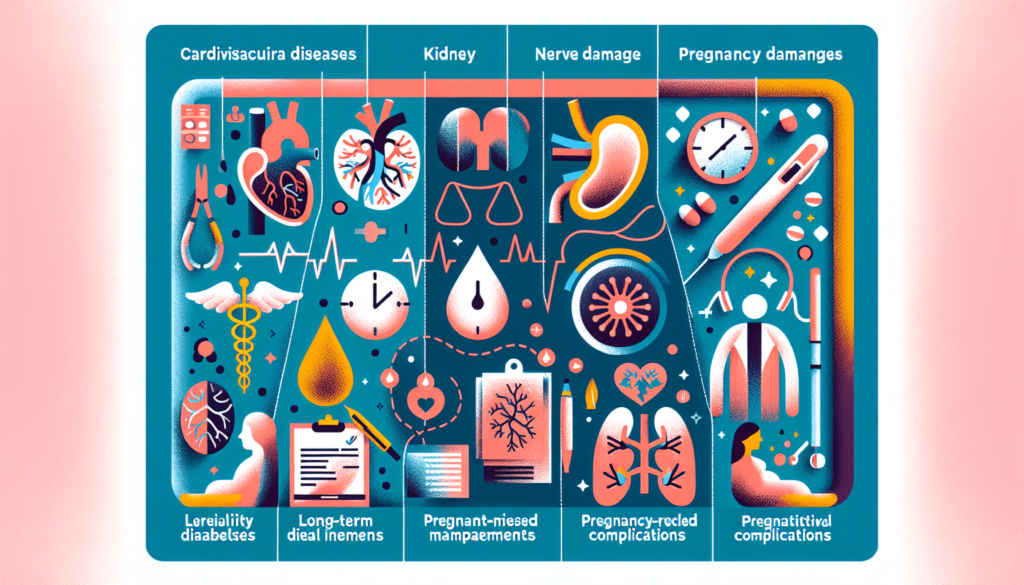Living with diabetes can pose various challenges, especially for women who are affected by this condition.
When it comes to long-term health concerns, women with diabetes may find themselves facing additional obstacles. The impact of diabetes on women’s health should not be overlooked, as there are specific concerns that they may encounter as they navigate through their daily lives. In this article, we will explore some of the long-term health concerns that women with diabetes may face, shedding light on the importance of addressing these issues to ensure their overall well-being.
In This Article
ToggleCardiovascular Health
When it comes to cardiovascular health, women with diabetes face an increased risk of heart disease. Diabetes can lead to the development of coronary artery disease, a condition where the blood vessels that supply the heart with oxygen and nutrients become narrow or blocked. This can lead to chest pain, shortness of breath, and even heart attacks.
In addition to coronary artery disease, high blood pressure is also a common concern for women with diabetes. High blood pressure can damage the blood vessels and organs, including the heart. It is important for women with diabetes to monitor their blood pressure regularly and take steps to manage it effectively.
Unfortunately, women with diabetes are also at a higher risk of experiencing a heart attack. The combination of diabetes and cardiovascular complications can increase the likelihood of a heart attack occurring. It is crucial for women with diabetes to be aware of the signs and symptoms of a heart attack and seek medical attention immediately if they suspect they are having one.
Reproductive Health
Diabetes can also impact a woman’s reproductive health in various ways. One of the common consequences is irregular menstrual cycles. The hormonal imbalances caused by diabetes can disrupt the regularity of menstrual periods, leading to irregularity or skipped periods.
Another reproductive health concern for women with diabetes is polycystic ovary syndrome (PCOS). PCOS is a condition characterized by hormonal imbalances, insulin resistance, and the presence of cysts in the ovaries. It can result in symptoms such as irregular periods, difficulty getting pregnant, and excessive hair growth.
Infertility is another issue that women with diabetes may face. The hormonal imbalances and potential complications of diabetes can affect fertility, making it harder for women to conceive. Seeking medical assistance and working with fertility specialists can help manage and overcome these challenges.
For women with diabetes who do become pregnant, there is an increased risk of complications during pregnancy. This includes a higher likelihood of gestational diabetes, preeclampsia, premature birth, and the need for a cesarean delivery. Close monitoring and proper management of blood sugar levels are crucial to reduce these risks and ensure a healthy pregnancy and delivery.

This image is property of images.pexels.com.
Kidney Disease
Diabetes is one of the leading causes of kidney disease, and women with diabetes are at an increased risk of developing diabetic nephropathy, which is kidney damage caused by diabetes. Over time, high blood sugar levels can damage the small blood vessels in the kidneys, impairing their ability to filter waste and toxins from the body.
Chronic kidney disease is another concern for women with diabetes. Once the kidneys are damaged, their function progressively declines, leading to the accumulation of waste and fluid in the body. This can result in symptoms such as fatigue, swelling, and increased blood pressure.
If kidney disease progresses to end-stage renal disease, the kidneys are no longer able to function properly, and dialysis or a kidney transplant may be required. It is essential for women with diabetes to closely monitor their kidney function through regular tests and work with healthcare professionals to manage their diabetes effectively and protect their kidneys.
Eye Complications
Diabetes can have significant effects on eye health, and women with diabetes are at an increased risk of developing various eye complications. Diabetic retinopathy is a condition where the blood vessels in the retina, the light-sensitive tissue at the back of the eye, become damaged and can lead to vision loss or blindness if left untreated.
Glaucoma is another eye complication that women with diabetes should be aware of. It is a group of eye conditions that cause damage to the optic nerve, often due to increased pressure in the eye. If untreated, glaucoma can lead to vision loss.
Cataracts, a clouding of the eye’s lens, are more common among people with diabetes, including women. This condition can cause blurry vision, glare, and difficulty seeing at night.
In severe cases, diabetes can even lead to blindness. It is essential for women with diabetes to have regular eye examinations and seek immediate treatment for any eye-related symptoms or changes in vision.

This image is property of images.pexels.com.
Neuropathy
Neuropathy refers to nerve damage caused by diabetes, and it can affect various parts of the body. Peripheral neuropathy is the most common type and affects the nerves in the extremities, such as the hands and feet. This can lead to symptoms such as tingling, numbness, and pain in these areas.
Autonomic neuropathy affects the nerves that control involuntary bodily functions, such as digestion, blood pressure, and heart rate. This can result in issues such as digestive problems, bladder and bowel dysfunction, and abnormal heart rate and blood pressure fluctuations.
Charcot joint, also known as diabetic neuropathic arthropathy, is a condition where the joints in the foot become weakened and deformed due to nerve damage. This can lead to foot deformities and eventually difficulty walking.
Nerve damage caused by diabetes can significantly impact a woman’s quality of life. It is important for women with diabetes to practice good foot care, manage blood sugar levels effectively, and seek medical attention if they experience any symptoms of neuropathy.
Gastroparesis
Gastroparesis is a condition that affects the movement of the muscles in the stomach, resulting in delayed stomach emptying. Women with diabetes are at an increased risk of developing gastroparesis due to the damage diabetes can cause to the nerves that control the muscles in the stomach.
Common symptoms of gastroparesis include nausea, vomiting, feeling full quickly, and abdominal bloating. It can also make it challenging to manage blood sugar levels effectively, as the delayed stomach emptying can lead to unpredictable absorption of food and medications.
Maintaining a healthy diet, taking medications as prescribed, and working closely with healthcare professionals to manage blood sugar levels are crucial for women with gastroparesis. In severe cases, more intensive treatments such as electrical stimulation of the stomach or feeding tubes may be required.
Skin Complications
Women with diabetes are more susceptible to various skin complications due to the effects of prolonged high blood sugar levels on the skin. Infections, both bacterial and fungal, are more common among individuals with diabetes. This is because high blood sugar levels create a favorable environment for the growth of bacteria and fungi.
Additionally, slow wound healing is a significant concern for women with diabetes. Even minor injuries or wounds can take much longer to heal and are more susceptible to infection. Proper wound care, including keeping the area clean and dry, is essential to prevent complications.
Ulcers and gangrene, a condition where the tissues in a specific area die off due to a lack of blood flow, are severe skin complications. Women with diabetes need to pay close attention to any wounds or sores on their feet, as poor blood circulation to the extremities can make it harder for these wounds to heal properly and increase the risk of developing ulcers and gangrene.
Mental Health
Living with diabetes can also have a significant impact on a woman’s mental health. The constant management of blood sugar levels, potential complications, and the overall stress of managing a chronic condition can increase the risk of depression. It is essential for women with diabetes to seek support from healthcare professionals, friends, and family to manage their mental health effectively.
Anxiety is another common mental health concern for women with diabetes. The uncertainty and worry that can come from managing blood sugar levels and the potential complications of diabetes can create anxiety and stress. Learning stress management techniques and seeking therapy or counseling can help women with diabetes address and manage their anxiety.
Diabetes distress is a specific type of emotional stress that is unique to individuals living with diabetes. It can be caused by the constant management and self-care required to manage diabetes effectively. Seeking support through diabetes education programs, support groups, and healthcare professionals can help women with diabetes cope with diabetes distress.
In some cases, women with diabetes may also be at an increased risk of developing eating disorders. The focus on food, diet, and weight management can sometimes lead to an unhealthy preoccupation with food and body image. It is crucial for women with diabetes to prioritize their mental and emotional well-being and seek help if they notice any signs of disordered eating.

Bone Health
Women with diabetes may experience an increased risk of osteoporosis, a condition characterized by weak and brittle bones. Prolonged high blood sugar levels and the hormonal imbalances associated with diabetes can affect bone health and density, putting women at a higher risk of fractures and low bone mineral density.
Impaired bone healing is another concern for women with diabetes. Wounds, fractures, or other injuries to the bones may take longer to heal and be more prone to complications such as infections. It is important for women with diabetes to take measures to protect their bone health, including regular exercise, a balanced diet rich in calcium and vitamin D, and avoiding smoking and excessive alcohol consumption.
Peripheral Vascular Disease
Peripheral vascular disease (PVD) is a condition where there is reduced blood flow to the limbs, often due to the narrowing or blockage of blood vessels. Women with diabetes may be at an increased risk of developing PVD, which can lead to various complications.
Peripheral artery disease is a common form of PVD and occurs when the blood vessels in the legs become narrowed or blocked. This can result in pain, cramping, and reduced mobility.
Women with diabetes are also more susceptible to foot ulcers and infections due to the reduced blood flow and nerve damage caused by diabetes. Poor blood circulation to the feet can make it harder for wounds to heal and increase the risk of infections. In severe cases, this can lead to gangrene and the need for amputation.
Proper foot care, including regular inspection of the feet, wearing appropriate footwear, and seeking immediate treatment for any wounds or infections, is crucial for women with diabetes to prevent complications associated with PVD.
In conclusion, women with diabetes face a multitude of long-term health concerns that can significantly impact their overall well-being. It is essential for women with diabetes to work closely with healthcare professionals, follow a comprehensive management plan, and prioritize self-care to reduce the risks and effectively manage these complications. By staying proactive and knowledgeable about their health, women with diabetes can live healthy and fulfilling lives.
FAQ: Long-Term Health Concerns for Women with Diabetes
Q1: What are the most common long-term health concerns for women with diabetes? A1: Long-term health concerns include cardiovascular disease, kidney damage, nerve damage, vision problems, and increased risk of infections. Women may also experience unique complications like pregnancy-related issues and menopausal complications.
Q2: How does diabetes affect women’s heart health differently than men’s? A2: Women with diabetes have a higher risk of heart disease compared to men with diabetes. The risk of heart attack and stroke is significantly increased, and women may experience these conditions at a younger age.
Q3: Can diabetes lead to complications during pregnancy? A3: Yes, diabetes can lead to complications such as gestational diabetes, preeclampsia, preterm birth, and the baby being born with a higher birth weight, which can complicate delivery.
Q4: What is diabetic neuropathy, and how does it affect women? A4: Diabetic neuropathy is nerve damage caused by high blood sugar levels. It can lead to numbness, tingling, pain, and weakness, primarily in the legs and feet. Women might also experience issues with their digestive system, urinary tract, and heart.
Q5: Are women with diabetes more susceptible to mental health issues? A5: Yes, women with diabetes may have a higher risk of depression and anxiety. The stress of managing a chronic condition, along with the physical impacts of diabetes, can contribute to these mental health challenges.
Q6: How does menopause interact with diabetes in women? A6: Menopause can complicate diabetes management due to hormonal changes that affect blood sugar levels. Women might experience more fluctuations in their glucose levels and may need to adjust their diabetes management plan.
Q7: Can diabetes affect a woman’s sexual health? A7: Yes, diabetes can lead to sexual health issues such as vaginal dryness, discomfort during sex, decreased libido, and a higher risk of urinary tract infections.
Q8: What measures can women with diabetes take to mitigate these long-term risks? A8: Regular monitoring of blood sugar levels, maintaining a healthy lifestyle, managing cholesterol and blood pressure, regular check-ups with healthcare providers, and addressing mental health are crucial steps in mitigating long-term risks.
Q9: How important is diet in managing long-term health concerns for women with diabetes? A9: Diet plays a critical role in managing diabetes and its long-term health concerns. A balanced diet rich in fruits, vegetables, whole grains, and lean proteins, while low in processed foods and sugars, can help maintain stable blood sugar levels and reduce complications.
Q10: Is there a higher risk of osteoporosis for women with diabetes? A10: Yes, women with diabetes may have an increased risk of osteoporosis. The link between diabetes and osteoporosis is complex, involving factors like insulin resistance, inflammatory markers, and changes in bone metabolism.
Related posts:
 Balancing Diabetes Management and Enjoyment through a Healthy Diet
Balancing Diabetes Management and Enjoyment through a Healthy Diet
 Menopause Support: 250mg DIM Supplement for Hormone Balance, Hot Flashes, Bloating, PMS Relief & Cystic Acne | Includes Dong Quai for Women’s Health | Soy-Free (60ct)
Menopause Support: 250mg DIM Supplement for Hormone Balance, Hot Flashes, Bloating, PMS Relief & Cystic Acne | Includes Dong Quai for Women’s Health | Soy-Free (60ct)
 Revitalize Your Gut and Slim Your Waist with our Pink Lemonade Detox Cleanse for Weight Loss and Digestive Health – Combat Bloating and Constipation for Both Women and Men
Revitalize Your Gut and Slim Your Waist with our Pink Lemonade Detox Cleanse for Weight Loss and Digestive Health – Combat Bloating and Constipation for Both Women and Men
 VORST Green Coffee Bean Extract: Natural Weight Loss Supplement for Men and Women | Appetite Suppressant, Fat Burner, and Cardiovascular Health Booster | 90 Capsules, 400mg | Supports Balanced Glucose Levels | 1 Bottle
VORST Green Coffee Bean Extract: Natural Weight Loss Supplement for Men and Women | Appetite Suppressant, Fat Burner, and Cardiovascular Health Booster | 90 Capsules, 400mg | Supports Balanced Glucose Levels | 1 Bottle
 Support Your Long-Term Wellness with Renew Actives High-Potency Berberine 500mg – Enhance Vitality and Boost Energy – 90 Capsules
Support Your Long-Term Wellness with Renew Actives High-Potency Berberine 500mg – Enhance Vitality and Boost Energy – 90 Capsules
 Tips for Managing Blood Sugar Levels Effectively
Tips for Managing Blood Sugar Levels Effectively











No comment yet, add your voice below!